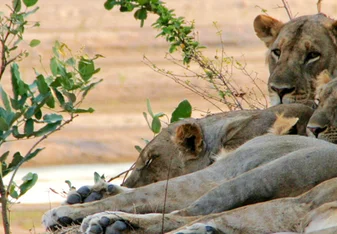Study Abroad Programs in South Africa
About
Go beyond the movies and discover the real Africa. South Africa, also known as "the Rainbow Nation," is one of Africa's most dynamic and up-and-coming countries. Commonly regarded as the birthplace of mankind, the African continent is a land of diverse and intense beauty that is not experienced by very many outsiders. It's about as far away from the US as you can get—a 15+ hour flight from JFK in New York to Johannesburg. Regardless—it's worth the effort!
Since the nation said "good bye" to apartheid in the early 90s, South Africa has undergone a dramatic transformation economically and politically, emerging on the world stage as one of the most important, democratic nations in all of Africa. Between South Africa's vibrant cities, diverse cultures and wildlife, booming economy, and increasingly reputable universities, it's no wonder it is fast becoming a popular study abroad destination for our adventure-seeking friends.
Popular Destinations
South Africa has many interesting cities to explore during your time abroad, but you will ultimately have to pick one to be your new "home away from home." Consider if you prefer to study in a large cosmopolitan city or in a more remote location. Keep in mind that a "small town" in Africa is probably a little different than a "small town" in the States—if you prefer stable electricity and running water, I'd recommend sticking to cities!
Cape Town
Cape Town, located near the southern most point of the African continent and on the eastern coast, is home to the oldest university in all of South Africa, the University of Cape Town. This university is internationally renowned for its contributions to research, especially in the field of HIV/Aids. Cape Town is the second largest city in South Africa, and it is a vibrant multicultural city with many options for daytime and evening fun! Located near the coast and at the base of the infamous Table Mountain, there's no shortage of activities for the adventurous and nature-loving. Nightclubs, shopping centers, and many restaurants are also readily available—Cape Town is definitely a city that won't disappoint!
While the city is quickly developing, many small neighborhoods remain on the outskirts that house people who are financially struggling. Studying abroad in Cape Town will give you the unique opportunities to see first hand this juxtaposition and to get involved in the movement to eradicate (or at the very least understand!) the poverty found in South Africa. Nearby Stellenbosch will provide a stark contrast to these areas; tucked away in a nearby valley, Stellenbosch is known for being Africa's largest wine producer and has a wide offering of art galleries, concerts, and festivals to attend.
Johannesburg
If you like cities, you'll love Johannesburg. As the largest city in South Africa, it serves as a gateway to travel across other destinations in southern Africa. Johannesburg was also the ringleader in the move against apartheid in the 1990s; you can walk the same streets as the protesters did, and see the legacies of these oppressive laws—if you're lucky, you may be able to hear a personal testimony! A trip to nearby Soweto offers plenty of learning opportunities, as well as some chill taverns and cafes to hang out in with local artists and university students.
The Museum Africa and the Apartheid Museum, the Newtown District and Market Theatre, and the Nelson Mandela Bridge all indicate incredible urban developments. While mostly steeped in urban and cultural options for fun, there still remains plenty of options for outdoor lovers. Nearby, you can find the caves of Sterkfontein, which house fossils dating back over 3.5 million years ago! How's that for hands on learning!?
Planning Your Trip
How to Choose a Program
South Africa's many multicultural universities are no strangers to the World University Rankings for the top universities across the world. South Africa has the strongest higher education system on the whole of Africa—rest easy knowing no matter where or what you choose to study, you are bound to get a great education. Some factors may influence your final decision more than others—we advise you to consider the following.
Language
Many classes are taught in English, ensuring a study abroad experience in South Africa has a relatively smooth transition. However, there are a number of African languages that you can opt to study—South Africa officially recognizes 11 languages in the country! Whether you choose to dabble in Bantu languages (commonly spoken around sub-Saharan Africa) or brush up on your Afrikaans, learning one of these languages may open up many unique opportunities in the future (especially for aspiring anthropologists!)
Housing
Different study abroad programs will afford you different options when it comes to selecting your housing for the duration of your experience overseas. Sometimes the cost of accommodation is not included in the overall program fees, but other times it is. Stay informed about your options and choose a program where you will be residing somewhere you find comfortable!
CIS Study Abroad provides apartment accommodations for all of their program participants, locating students within 5-10 minutes walking distance of the university, and CEA places students directly into on campus international student housing. If you're looking for something a little more adventurous, consider the Center for Global Education's program in southern Africa (it includes three home stays—even one in Soweto).
Still need more info? We suggest Stoogle's guide on student housing in South Africa.
Immersion and Cultural Activities
Another option to consider when selecting your study abroad program provider is the amount of activities that are included in the overall cost. Some programs will automatically factor in these culturally enlightening excursions into their program fees, while others will let you select and add on activities as you see fit.
CIS Abroad's program does not include any package cultural activities outside of their welcome orientation—this is an ideal program for students interested in independent weekend adventures! Alternatively, IES Abroad's program in Cape Town includes exciting excursions such as visits to nearby canyons and mountain ranges, AND a 3 hour game drive in an open safari vehicle!
Visa
To get your South African student visa, you’ll need to provide proof that you have been accepted (at least provisionally) to a recognized learning institution. It typically takes 4 to 8 weeks to process the visa, and you can study in the country up to 8 years once approved. Overall, not a super had process, but do be prepared to get it done well in advance. (Source: Savisas.com.)
Costs & Funding
Generally speaking, South Africa is a pretty affordable country to study abroad in. For example, you should expect to spend $375 - $700 per month in rent. Buses are between $0.57 - $3.5 per ride. A beer costs around $1.50. Source: Stoogle.
Scholarships
That 17-hour flight south may not be cheap—but your experience in South Africa does not have to be a financial nightmare. Many study abroad program providers have independent scholarships available for their program participants. If those options seem slim, here a few more avenues you can consider!
- The Center for Global Education offers a "Diversity Scholarship" for students who have not been traditionally represented in study abroad, with awards totaling in up to 50% of your total program costs!
- The Boren Awards specifically provide scholarships for U.S. undergraduate and graduate students to become more proficient in the cultures and languages of world regions critical to U.S. interests, including Africa!
- As a non-profit, the various USAC study abroad scholarship opportunities aim for students to gain international experience -- without breaking the bank.
- More Study Abroad Grants and Scholarships
























